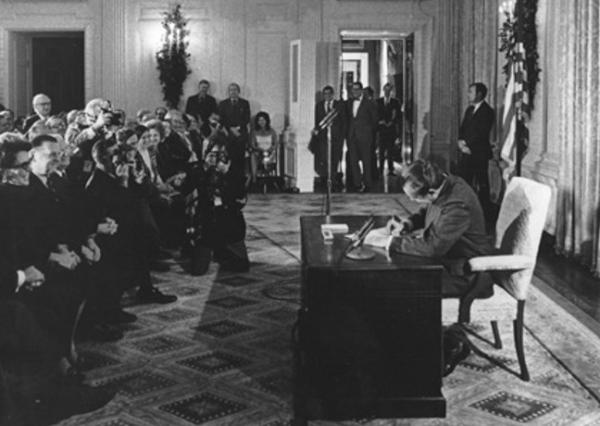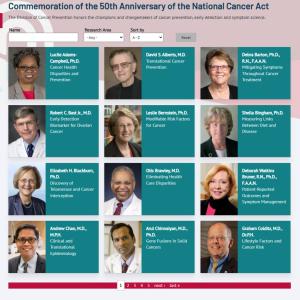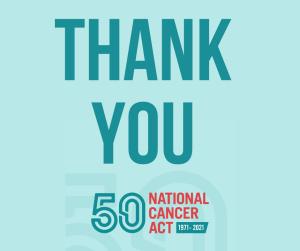Date Posted, by Philip E. Castle, Ph.D., M.P.H.
Fifty years ago this week, the National Cancer Act was signed into law, kick-starting research that has changed how cancer is prevented, detected, diagnosed, treated, and survived, and moving us closer to a time when no one dies of cancer.

President Richard Nixon signing the National Cancer Act on December 23, 1971.
Starting in March of this year, we, the NCI Division of Cancer Prevention, honored the champions and changemakers of prevention, detection, and supportive care science, including those who focused on cancer health disparities in these areas. When we brainstormed who should be included among the individuals who gave years of their lives and work to ending cancer, we came up with more names than we could feature in one year.
Each story we posted tells a small part of the larger story of cancer research, a story that is still unfolding as we work to end cancer as we know it, to use President Biden’s words. In 1971, the cancer we knew was largely fatal, hard to detect and hard to prevent. As the Division of Cancer Prevention, we are renewing the call of the original National Cancer Act and working to end cancer as we know it today. One of the best ways to change the narrative about cancer, to end it as we know it now, is, to prevent it from even happening.
I had the privilege of presenting my vision for the future of cancer prevention, detection, and supportive care science to the combined advisory boards of the National Cancer Institute: the National Cancer Advisory Board (NCAB) and Board of Scientific Advisors (BSA) on December 9. In addition to the three strong research and development pathways of the division—preventive agent identification and development, screening and early detection, and symptom management/supportive care—we are also training the next generation of researchers in the Cancer Prevention Fellowship Program.
Commemoration of the 50th Anniversary of the National Cancer Act

I have proposed that we prioritize interventions based on biological risk and population risk. Biological risk is identified within the pathways of carcinogenesis to answer questions such as: Do you have an inherited mutation in a gene? Is there a biomarker that indicates your risk? This is precision cancer prevention in action. Population risk is using someone’s risk to decide who gets screened, how they get screened, and ensuring equal care for equal risk.
Another emerging area pertains to being obese, which increases a person’s risk for certain cancers but we do not understand how. If we understood what is happening, we could develop strategies to reduce obesity-related cancer risk. Even if we can get people to make lifestyle choices that result in better energy balance and leaner body mass, there are generations of people who have been exposed to this carcinogen.
For the third leg of DCP’s portfolio, symptom science and supportive care research, we need to use biology, genetics, and epidemiology to understand the cause of symptoms, explain why treatments cause adverse effects, and continue to move the field of symptom management from trial-and-error to precision medicine.
In the years ahead, we are going to evaluate new technologies like artificial intelligence, multi-cancer early detection assays, synthetic biomarkers, and others to find out what is good and what is not. We know that innovations in technologies like self-collection of samples for screening can bring standard-of-care (or better) to underserved populations who are typically at higher risk of cancer. Importantly, we want to ensure that these new, promising technologies work and are available to everyone, so we close gaps in health inequities that plague our country.
And we want to delve deeper into immunology and preventive vaccinations to find what constitutes an effective immune response to a carcinogenic insult. This means more neoantigen discovery and validations. The first such trial of this kind of prevention will be in people with Lynch syndrome in 2022.
There is so much yet to achieve to end cancer as we know it, but the science is here, and the researchers who will decipher and end this disease are hard at work.
So, on this 50th anniversary of the greatest U.S. movement to stop cancer using science, I want to show some heart-felt gratitude:

To the scientists we named as our Champions and Changemakers this past year, who represent all the farsighted, adaptable, esteemed, and often tenacious investigators who laid the groundwork for where the research goes next – THANK YOU.
To all the teams who worked with each of these researchers, the post-docs, the junior researchers, the lab techs, the research nurses, and administrators, and to all who support them – THANK YOU.
To all the scientists and research teams who could not be named by us this year, but whose work moves us closer to our goal – THANK YOU.
To every person who agreed to take part in a clinical trial to prevent cancer, detect cancer, or manage their symptoms and side effects of treatment: We could not carry out our studies without your faith in us – THANK YOU.
And last, but not least, to All the amazing staff in the NCI Division of Cancer Prevention, some who have worked here for much of the 50 years of the National Cancer Act, – THANK YOU!! Your dedication to public service and to our mission to improve the health of all people is our foundation.
I want to name the people who have been at DCP for 20 years or more, to thank them for their long-term involvement in cancer prevention research, which brings us to the current era of hope and possibility:
Stuart Baker, Sc.D.
Martha Basinger
Vance Berger, Ph.D.
Dan Boring, R.Ph., Ph.D.
Eileen Dimond, R.N., M.S.
Barbara Dunn, M.D., Ph.D.
Richard Fagerstrom, Ph.D.
Leslie Ford, M.D.
Maggie House, R.N.
Ping Hu, Sc.D.
Grant Izmirlian, Ph.D.
Young Kim, Ph.D.
Victor Kipnis, Ph.D.
Win Malone, Ph.D., M.P.H.
Guillermo Marquez, Ph.D.
Worta McCaskill-Stevens, M.D., M.S.
Doug Midthune, M.S.
Lori Minasian, M.D.
Joy Osborne, M.S., M.P.A.
Howard Parnes, M.D.
Marjorie Perloff, M.D.
Paul Pinsky, Ph.D.
Ellen Richmond, M.S., G.N.P.
Sharon Ross, Ph.D., M.P.H.
Harold Seifried, Ph.D.
Kara Smigel, M.S.
Sudhir Srivastava, Ph.D., M.P.H.
Eva Szabo, M.D.
Asad Umar, D.V.M., Ph.D.
Wendy Wang, Ph.D., M.Sc.
Jacqueline Whitted, Ph.D.
Linda Wong
Jian-Liu Xu, Ph.D.
I’m looking forward to a future full of health and an end to cancer as we know it.Let’s make 2022 our best year yet.
If you would like to reproduce some or all of this content, see Reuse of NCI Information for guidance about copyright and permissions. Please credit the National Cancer Institute as the source and link directly to the blog post using the original title, for example: "Ending Cancer as We Know It Is the Work of Many Capable Hands: A Moment to Say "Thank You" was originally published by the National Cancer Institute." For questions, contact us at CancerPreventionBlog@mail.nih.gov.
